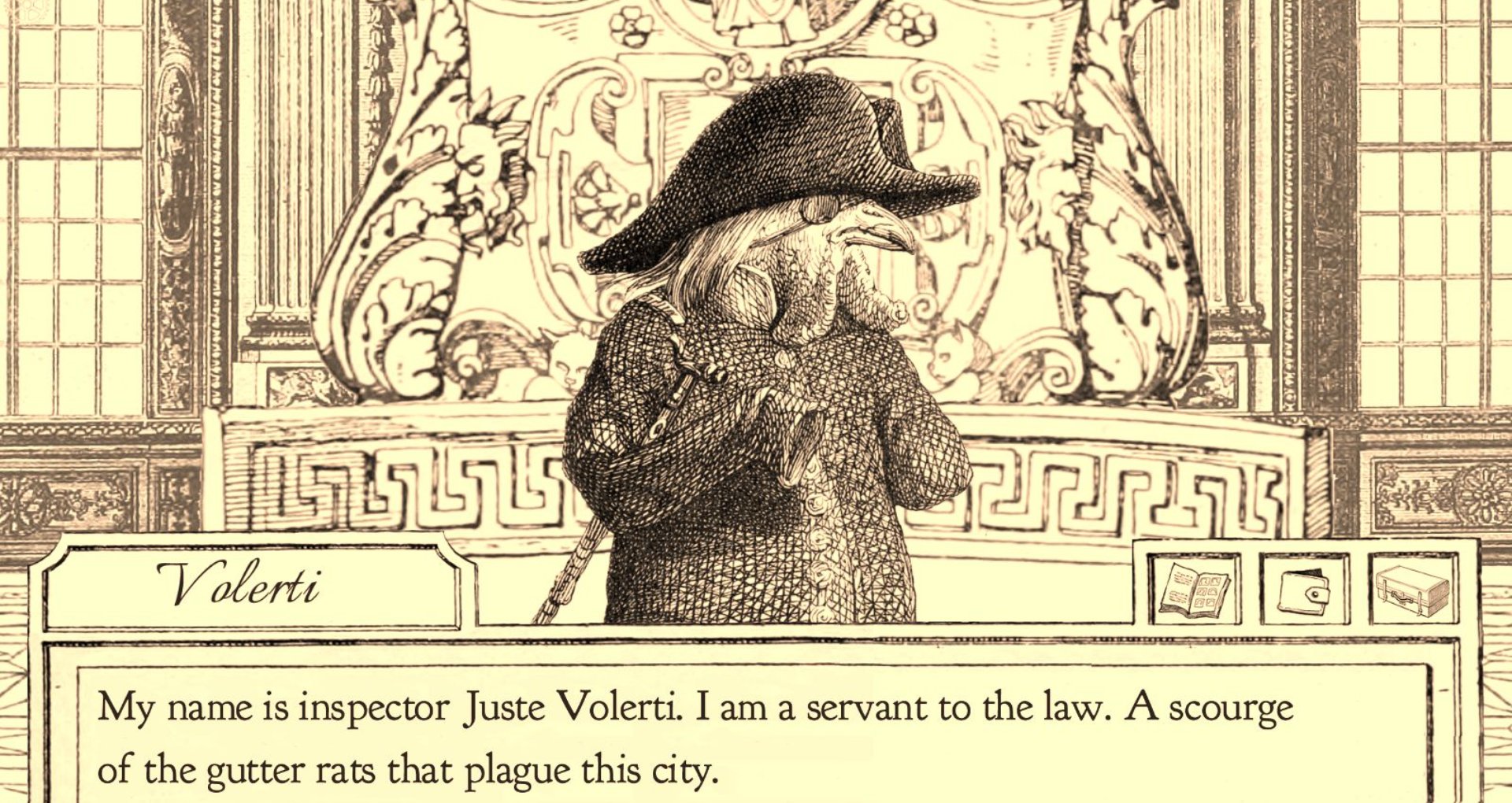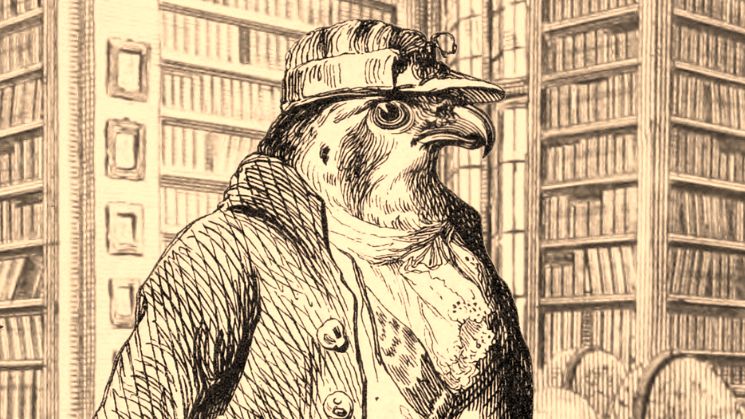Our Verdict
More rich quail rather than plump-breasted pheasant, but still a rare and satisfying bird.
PC Gamer's got your back
What is it? A visual novel about legal eagles set in 1840s France
Influenced By: Ace Attorney, The Public and Private Life of Animals
Reviewed On: i5-3230 CPU, 8GB RAM
Expect to pay: £10.99 / $14.99
Release: Out Now
Publisher: Sketchy Logic
Developer: Sketchy Logic
Link: Official site
Multiplayer: None
At first glance, Aviary Attorney might seem a mere novelty—the gaming equivalent of book about pugs dressed like Ryan Gosling. This is no throwaway toilet digest, though. It’s a compact, engaging visual novel, full of smart twists and raptorial wit. (It also has sandwich puns and a donkey librarian. We’ll get to those later.)
It’s follows the story of two bird lawyers, Jayjay Falcon and his assistant Sparrowson, as they endure revolutionary turmoil in 1840s France. It’s been described as Hatoful Boyfriend meets Ace Attorney. That’s an idle summary, which is only partially correct. Like Phoenix Wright, you’re presented with a case you can only win through selective cross examination and inventive use of evidence. You personally gather information prior to each case, via investigation, interviews and – sometimes – thievery. The only thing it has in common with Hatoful Boyfriend is, well, birds.
It’s an eccentric idea, but it works. You have limited time to explore Paris for clues before your case goes to court. You visit different locations in Paris, talk to witnesses and gather facts about your case. This investigative element makes Aviary Attorney feel as much like a detective game as a legal one (Clucklumbo? Hercule Parrot? Dale Coop? Let’s move on). You’re rarely given the full story, and it’s fun to discover what actually happened by reverse engineering your defence with whatever scraps of evidence you can find. There are red herrings—and I mean literal herrings, which are red—but I loved exploring such a rich, unusual world.

Best of all, it’s possible to fail horribly. It might sound a strange thing to celebrate—like laughing at a fallen elderly relative—but it adds murky peril to every trial. Waste too much time on irrelevant questions and the case can be thrown out. It doesn’t end there, either; you’re forced to live with the rotten decisions as well as the righteous ones, and both flavour the ending of the game. The story feels reactive because of this, and different playthroughs reveal different paths. I experimented with varied approaches to key situations, and the narrative deviated in a ways I could never predict. It often feels like there’s a correct choice, but it’s satisfying to know that most options have an alternate outcome—even if some are bleaker than a bin bag of broken toys.
It’s never straightforward. I strutted through my first trial, swollen with confidence, but the game expertly denied me a simple conclusion. It didn’t undermine my victory, but instead offered a caustic reminder that desirable results aren’t always the most just. At the risk of sounding like a dusty jurisprudence professor, Aviary Attorney is better for asking solemn questions about the balance of law and morality. Also: lions in top hats!
It’s more handsome than Napoleon’s toothbrush, too. Character artwork is sourced directly from French caricaturist J. J. Grandville, and the backgrounds come from public domain lithographs. It’s brought to life through the simple, unobtrusive animation, with figures that bounce and blink while retaining the mischievous charm of the original works. There’s only one occasion where the quality of the background and characters slips—sadly during one of the game’s most important scenes—but the fact it’s even noticeable says everything about the consistently high standard of presentation.
The most impressive thing in Aviary Attorney is how substantive the characters are.
It’s not just about how good they look, though. The most impressive thing in Aviary Attorney is how substantive the characters are. There’s no voice acting, so intonation and temperament come from a simple selection of honks, bleeps and parps. They’re believable enough that at I found myself imagining Russell Crowe as Monsieur Falcon, before I realised that would be like casting a lunch wagon as Atticus Finch. My favourite was the grumpy librarian, who transforms from trope to tragedy with one throwaway line, which I won’t spoil it here. Some characters, such as the richly-maned, monied lion, initially feel like narrative shortcuts, but fresh appraisal is only ever a plot twist away.
The quality of the writing extends to the script, but like many games it’s witty, rather than roisterous. It’s filled with cheery references to modern social media, and every possible French term is punned. It rarely made me laugh, but it’s consistently pleasant company. Likewise, the story is engaging without being enthralling. It took me around four hours to complete, which felt about right—I wanted to know how it ended, and there were still two additional cases I didn’t see on my first game. One more case would have been welcome—compiling and using evidence is the game’s primary mental challenge, and you have limited opportunity to do it. That said, there’s something agreeable about a game tasty enough to leave you wanting more, without ever making you feel bloated or bored.
More rich quail rather than plump-breasted pheasant, but still a rare and satisfying bird.


